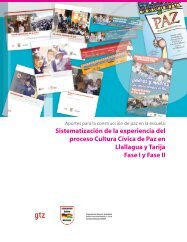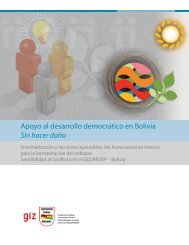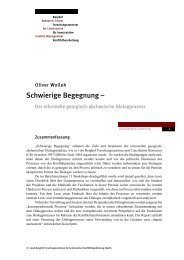Systemische Konflikttransformation. Konzept und Anwendungsgebiete
Systemische Konflikttransformation. Konzept und Anwendungsgebiete
Systemische Konflikttransformation. Konzept und Anwendungsgebiete
Sie wollen auch ein ePaper? Erhöhen Sie die Reichweite Ihrer Titel.
YUMPU macht aus Druck-PDFs automatisch weboptimierte ePaper, die Google liebt.
Prozess“). Der systemische Charakter der beiden komplementären Vorhaben lässt sich vor<br />
allem mit den drei ersten beim Sri Lanka Projekt genannten Kriterien beschreiben: (1) Arbeit<br />
an einer umfassenden Vision eines re-imaginierten Verhältnisses von Georgien-Abchasien, (2)<br />
Entwicklung von friedensfördernden Subsystemen <strong>und</strong> (3) Identifizierung <strong>und</strong> Förderung<br />
einer kritischen Masse von Einflusspersonen.<br />
Das von CR durchgeführte Aktionsprogramm besteht seit 1997. Es begann ursprünglich mit<br />
einer Reihe kleiner Unterstützungsprojekte für einheimische Organisationen <strong>und</strong> entwickelte<br />
sich zu einem kohärenten Programm, das über 30 CSO <strong>und</strong> Medienorganisationen in der<br />
Region, Partnerschaften mit internationalen Organisationen <strong>und</strong> NGOs sowie Beziehungen zu<br />
Beamten <strong>und</strong> Politikern umfasst. Die Komponenten des <strong>Konflikttransformation</strong>sprogramms<br />
umfassen unter anderem: i) Unterstützung von CSO <strong>und</strong> IDP communities (internally<br />
displaced persons) in Georgien <strong>und</strong> Abchasien (u.a. durch Trainingsmaßnahmen,<br />
Kleinprojektefond, Sommeruniversität, NGO Forum); ii) Arbeit mit Journalisten <strong>und</strong><br />
Unterstützung von Medienprojekten (transformative Zeitungsberichterstattung, Radio,<br />
Fernsehen, Aufbau von community radio-Projekten, Dokumentarfilme); iii) Schaffung von<br />
Möglichkeiten <strong>und</strong> Räumen für Dialog, Reflektion <strong>und</strong> Analyse (u.a. Studienreisen, Seminare,<br />
„Schlaining-Prozess“).<br />
Das Gesamtziel von CR’s Kaukasus Arbeit besteht darin, die Aussichten für eine friedliche <strong>und</strong><br />
gerechte Transformation des Konflikts über Abchasien zu verbessern <strong>und</strong> eine Kultur des<br />
Friedens zu befördern, welche auf Gerechtigkeit <strong>und</strong> gegenseitigem Respekt basiert. Aus<br />
diesem übergeordneten Ziel leiten sich folgende Zielsetzungen <strong>und</strong> Strategien ab:<br />
OBJECTIVES AND STRATEGIES OF THE CONFLICT TRANSFORMATION PROGRAMME<br />
To increase the ability of societies to deal with <strong>und</strong>erlying factors that perpetuate conflict<br />
• Supporting/accompanying local organisations to become more effective<br />
• Linking partners/NGOs with other organisations and individuals with specific development,<br />
democratisation, human rights, rehabilitation expertise<br />
• Creating a critical mass of change agents: working with influential social and political groups and<br />
individuals to build their capacity<br />
• Broadening horizons and encouraging exposure to new ideas<br />
• Engaging marginalised constituencies and groups that present obstacles to peace building<br />
Influencing stakeholders’ Conflict Transformation strategies<br />
• Creating opportunities for engagement across the divide: dialogue<br />
• Encouraging speculative problem solving: creating ideas<br />
• Advocating approaches to policy change<br />
• Providing exposure to comparative experience<br />
To alter the public discourse aro<strong>und</strong> the conflict<br />
• Improving the quality and diversity of media coverage in the regions<br />
• Challenging stereotypes: engaging broader society in debate<br />
• Stimulating debate on democratic and non-violent options for change<br />
• Creating opportunities for ‘internal dialogue’ within the separate communities<br />
• Providing opportunities for reflection and analysis for politicians, officials, civic activists and<br />
journalists<br />
• Increasing public access to information within the communities and across the conflict divide<br />
Influencing external Conflict Transformation policies<br />
• Sharing expertise, analysis and contacts with INGOs, IGOs, Governments and academics<br />
• Advocating approaches to policy change<br />
• Linking external policy makers with voices from the region<br />
Das georgisch-abchasische • Maintaining links with Dialogprogramm a wide range of others begann working 1997, to influence als das policy erste Seminar des<br />
georgisch-abchasischen<br />
• Working to change<br />
Dialogprozesses<br />
donors’ approaches<br />
gemeinsam<br />
to working in<br />
vom<br />
and on<br />
Berghof<br />
the conflict<br />
Forschungszentrum <strong>und</strong><br />
BFPS Studie – <strong>Systemische</strong> <strong>Konflikttransformation</strong><br />
20





